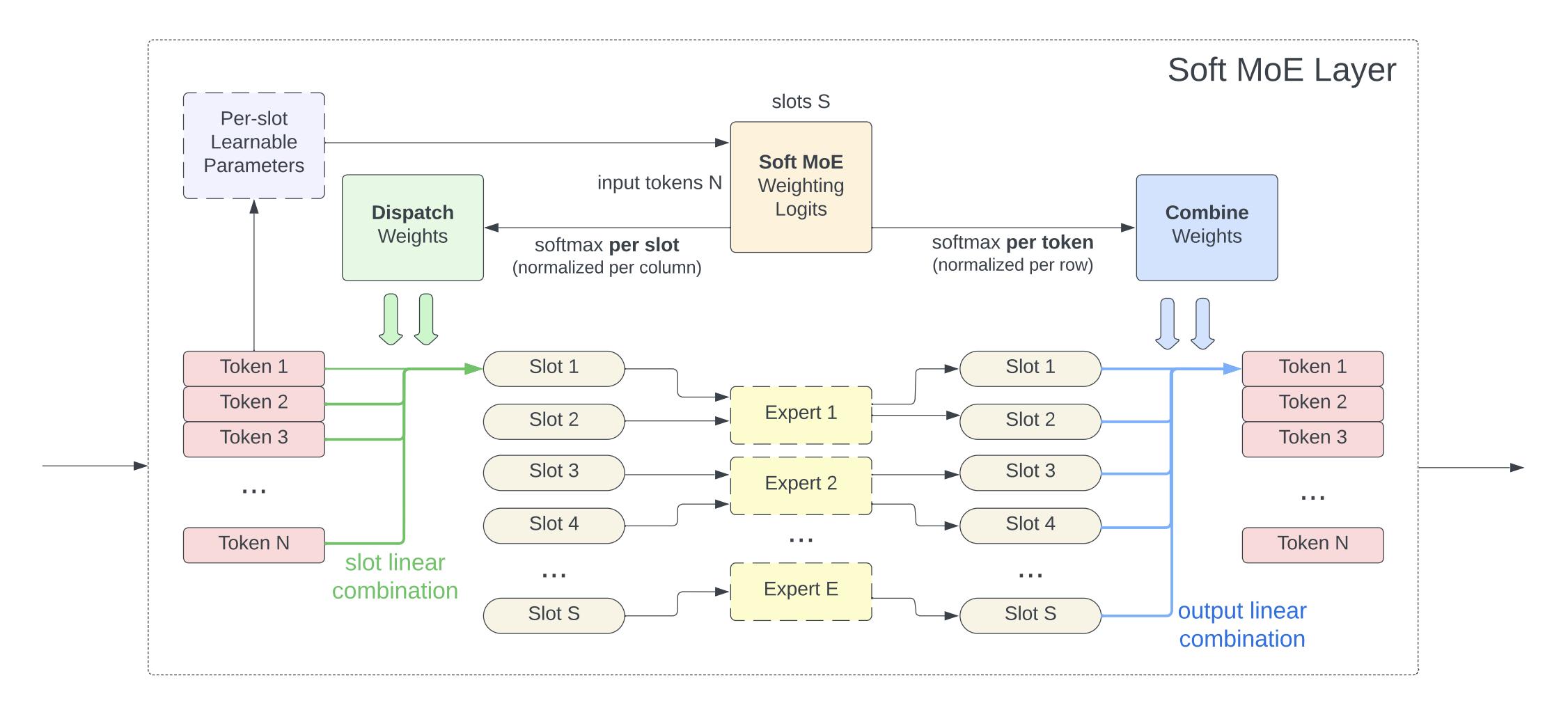soft-mixture-of-experts
PyTorch implementation of Soft MoE by Google Brain in From Sparse to Soft Mixtures of Experts
Thanks to lucidrains for his excellent
x-transformerslibrary! 🎉The ViT implementations here are heavily based on his ViTransformerWrapper.
TODO
- Implement Soft MoE layer (Usage, Code)
- Example end-to-end Transformer models
- Set up unit tests
- SoftMoE
- Transformer layers
- ViT models
- Reproduce parameter counts from Table 3 (Ablations)
- Reproduce inference benchmarks from Tables 1, 2 (Ablations)
- Release on PyPI
- Prerelease
- Stable
Install
PyPI:
pip install soft-mixture-of-expertsFrom source:
pip install "soft-mixture-of-experts @ git+ssh://git@github.com/fkodom/soft-mixture-of-experts.git"For contributors:
# Clone/fork this repo. Example:
gh repo clone fkodom/soft-mixture-of-experts
cd soft-mixture-of-experts
# Install all dev dependencies (tests etc.) in editable mode
pip install -e .[test]
# Setup pre-commit hooks
pre-commit installUsage
Vision Transformers
Using the ViT and SoftMoEViT classes directly:
from soft_mixture_of_experts.vit import ViT, SoftMoEViT
vit = ViT(num_classes=1000, device="cuda")
moe_vit = SoftMoEViT(num_classes=1000, num_experts=32, device="cuda")
# image shape: (batch_size, channels, height, width)
image = torch.randn(1, 3, 224, 224, device="cuda")
# classification prediction
# output shape: (batch_size, num_classes)
y_vit = vit(image)
y_moe = moe_vit(image)
# feature embeddings
# output shape: (batch_size, num_patches, d_model)
features_vit = vit(image, return_features=True)
features_moe = moe_vit(image, return_features=True)or using pre-configured models:
from soft_mixture_of_experts.vit import soft_moe_vit_small
# Available models:
# - soft_moe_vit_small
# - soft_moe_vit_base
# - soft_moe_vit_large
# - vit_small
# - vit_base
# - vit_large
# - vit_huge
# Roughly 930M parameters 👀
moe_vit = soft_moe_vit_small(num_classes=1000, device="cuda")
# Everything else works the same as above...Transformer Layers
from soft_mixture_of_experts.transformer import (
TransformerEncoder,
TransformerEncoderLayer,
TransformerDecoder,
TransformerDecoderLayer,
)
encoder = TransformerEncoder(
TransformerEncoderLayer(d_model=512, nhead=8),
num_layers=6,
)
decoder = TransformerDecoder(
TransformerDecoderLayer(d_model=512, nhead=8),
num_layers=6,
)
# input shape: (batch_size, seq_len, d_model)
x = torch.randn(2, 128, 512, device="cuda")
mem = encoder(x)
print(mem.shape)
# torch.Size([2, 128, 512])
y = decoder(x, mem)
print(y.shape)
# torch.Size([2, 128, 512])Soft MoE
import torch
from soft_mixture_of_experts.soft_moe import SoftMoE
# SoftMoE with 32 experts, 2 slots per expert (64 total):
moe = SoftMoE(
in_features=512,
out_features=512,
num_experts=32,
slots_per_expert=2,
bias=False, # optional, default: True
device="cuda", # optional, default: None
)
# input shape: (batch_size, seq_len, embed_dim)
x = torch.randn(2, 128, 512, device="cuda")
y = moe(x)
print(y.shape)
# torch.Size([2, 128, 512])Ablations
I closely reproduce the parameter counts and (relative) inference times from the paper.
Table 3
All models are benchmarked with:
batch_size = 8 # see note below
image_size = 224
num_channels = 3
num_classes = 21000 # as in ImageNet 21k
$\dagger$ The authors benchmark "eval ms/img" using TPUv3, and I use single A100 40GB. The authors also are not clear on the batch size used for inference. In Figure 6, they specifically mention using batch size 8. So, I assume a batch size of 8, and observe that inference times are similar to what is reported in the paper.
| Model | Params | Params (paper) |
Eval ms/img |
Eval ms/img (paper) |
|---|---|---|---|---|
| ViT S/16 | 30 M | 33 M | 0.9 | 0.5 |
| Soft MoE S/16 128E | 932 M | 933 M | 1.3 | 0.7 |
| Soft MoE S/14 128E | 1.8 B | 1.8 B | 1.5 | 0.9 |
| ViT B/16 | 102 M | 108 M | 1.0 | 0.9 |
| Soft MoE B/16 128E | 3.7 B | 3.7 B | 1.5 | 1.5 |
| ViT L/16 | 325 M | 333 M | 1.8 | 4.9 |
| Soft MoE L/16 128E | 13.1 B | 13.1 B | 3.5 | 4.8 |
Test
Tests run automatically through GitHub Actions on each git push.
You can also run tests manually with pytest:
pytestCitations
@misc{puigcerver2023sparse,
title={From Sparse to Soft Mixtures of Experts},
author={Joan Puigcerver and Carlos Riquelme and Basil Mustafa and Neil Houlsby},
year={2023},
eprint={2308.00951},
archivePrefix={arXiv},
primaryClass={cs.LG}
}